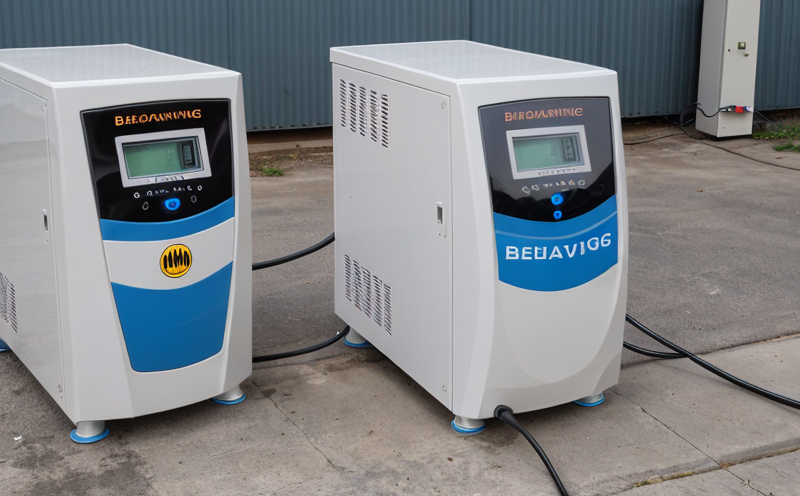GB/T 31484 Charging and Discharging Behavior Testing of Lithium-Ion Power Batteries
The GB/T 31484 standard is a crucial document for the testing of charging and discharging behavior in lithium-ion power batteries. This service ensures that batteries meet stringent quality standards, which are essential for various applications including electric vehicles (EVs), energy storage systems, and other high-performance devices.
The charging and discharging behavior of lithium-ion batteries is critical to their performance and longevity. Understanding how these batteries behave under different conditions can significantly impact the design and application of EVs and battery-powered equipment. The GB/T 31484 standard provides a comprehensive framework for testing, ensuring that manufacturers meet specific criteria related to safety, efficiency, and durability.
The test protocol involves subjecting lithium-ion power batteries to various charging and discharging cycles under controlled conditions. This process simulates real-world usage scenarios to assess the battery's performance metrics such as capacity retention, charge acceptance, discharge efficiency, and cycle life. The standard also covers safety aspects like overcharge protection, over-discharge tolerance, and thermal stability.
Charging and discharging behavior testing is essential for ensuring that batteries meet stringent quality standards. This service helps manufacturers identify potential weaknesses in their products early on, allowing them to make necessary adjustments before commercial release. Additionally, it provides third-party verification of battery performance, which is critical for compliance with regulatory requirements.
The GB/T 31484 standard specifies detailed procedures and acceptance criteria for performing charging and discharging tests. It covers various parameters such as charging current, voltage limits, temperature control, and safety monitoring systems. The test setup typically includes specialized battery testers equipped with precise measurement instruments to ensure accurate data collection.
Compliance with the GB/T 31484 standard is mandatory for manufacturers who wish to sell their products in China or meet specific regulatory requirements. This service ensures that batteries undergo rigorous testing, providing confidence in their performance and reliability.
Charging and discharging behavior testing plays a vital role in ensuring the safety and efficiency of lithium-ion power batteries. By adhering to the GB/T 31484 standard, manufacturers can enhance product quality, improve customer satisfaction, and maintain competitive advantage in the market.
- Battery testers equipped with advanced measurement instruments
- Controlled charging and discharging cycles
- Precise temperature monitoring systems
- Safety monitoring features for real-time data analysis
- Data logging capabilities to record test results
Manufacturers who adhere to the GB/T 31484 standard can ensure that their lithium-ion power batteries meet high-quality standards, thereby enhancing product performance and reliability. This service offers valuable insights into battery behavior under various conditions, enabling manufacturers to optimize design parameters and improve overall efficiency.
Scope and Methodology
The scope of the GB/T 31484 standard includes testing the charging and discharging behavior of lithium-ion power batteries. The methodology involves subjecting the batteries to various cycles under controlled conditions, simulating real-world usage scenarios.
- Charging current limits
- Voltage thresholds for safety
- Temperature control during tests
- Safety monitoring systems in place
The testing process is designed to evaluate key performance indicators such as capacity retention, charge acceptance, discharge efficiency, and cycle life. Additionally, the standard addresses battery behavior under extreme conditions like overcharge protection and over-discharge tolerance.
Manufacturers can use this service to ensure their products meet stringent quality standards, thereby enhancing customer confidence in product reliability and safety. The testing process helps identify potential weaknesses early on, allowing for necessary adjustments before commercial release.
EuroLab offers unparalleled expertise in GB/T 31484 charging and discharging behavior testing of lithium-ion power batteries. Our team of experienced professionals ensures that every test adheres to the highest standards, providing reliable data for decision-making.
- State-of-the-art equipment
- Comprehensive testing protocols
- Detailed reports with actionable insights
- Expertise in battery technology and safety
We understand the importance of meeting regulatory requirements and ensuring product quality. EuroLab's commitment to excellence ensures that clients receive accurate, reliable test results, helping them stay ahead of industry trends.
Our services go beyond compliance; we offer valuable insights into battery behavior under various conditions, enabling manufacturers to optimize design parameters and improve overall efficiency.





